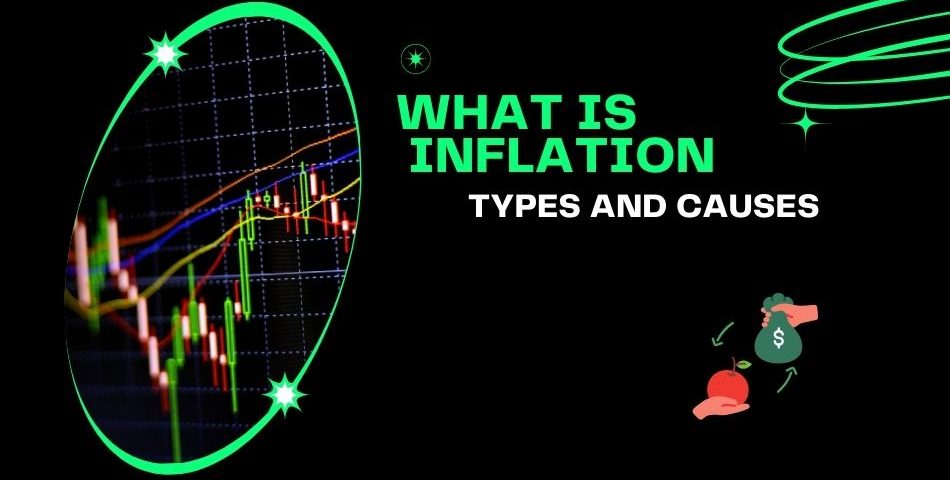What is Inflation? Types , causes and masurement

Central Bank Meetings: Federal Reserve, ECB, and BoE – Key Trading Event
September 24, 2024
How to Scale a Business: Essential Strategies for Sustainable Growth
September 26, 2024Introduction
Inflation is the steady increase in the prices of goods and services over time. It means that as inflation occurs, each unit of currency buys fewer goods and services. This price rise can erode your purchasing power, making things more expensive even if your income remains the same.
Understanding inflation is crucial for managing personal finances because it directly impacts everything from the cost of groceries to the interest rates on loans. But what exactly causes inflation, and how does it affect the broader economy?
What Causes Inflation?
Inflation can occur for several reasons, and economists typically break it down into three main categories:
Demand-Pull Inflation
Demand-pull inflation happens when the demand for goods and services exceeds their supply. When consumers are willing to spend more, producers may raise prices to meet the increased demand. This kind of inflation usually happens when the economy is strong, and people have more disposable income to spend. As demand increases, prices naturally rise, creating inflation.
Cost-Push Inflation
Cost-push inflation occurs when the cost of production increases. This could be due to higher wages, increased material costs, or a rise in fuel prices. When production becomes more expensive, companies pass those costs onto consumers by raising prices, leading to inflation. For instance, if the price of oil rises sharply, the cost of goods that rely on transportation also goes up, contributing to inflation.
Built-In Inflation
Built-in inflation, sometimes referred to as “wage-price inflation,” occurs when workers demand higher wages to keep up with rising costs of living. As wages increase, companies raise the prices of their products to cover these costs, which in turn leads to more inflation. It’s a cycle that feeds itself, as wages and prices continually push each other upward.
How Is Inflation Measured?
Governments and economists use specific tools to measure inflation and track price changes over time. The most common methods include:
Consumer Price Index (CPI)
The Consumer Price Index (CPI) is the most widely used measure of inflation. It tracks the price changes of a specific basket of goods and services, such as food, transportation, and healthcare. By comparing the current prices to those in a base year, economists can determine how much inflation has occurred.
Producer Price Index (PPI)
The Producer Price Index (PPI) measures inflation at the wholesale level, meaning it tracks the prices that producers charge for goods before they reach consumers. While the CPI focuses on consumer prices, the PPI gives an early indication of inflationary trends, as increases in producer costs often lead to higher consumer prices.
Other Inflation Indicators
Other indicators include the Gross Domestic Product (GDP) deflator and personal consumption expenditures (PCE) index, which provide a broader look at inflation in the economy by measuring price changes across all goods and services.
The Effects of Inflation on the Economy
Inflation has far-reaching effects on the economy, and understanding its impact can help individuals and businesses prepare for changes in financial conditions.
How Inflation Affects Purchasing Power
One of the most noticeable effects of inflation is its impact on purchasing power. As inflation rises, the value of money decreases, meaning that consumers can buy fewer goods and services with the same amount of money. This can lead to higher living costs and lower standards of living, especially for those with fixed incomes.
Impact on Wages and Savings
Inflation affects wages in complex ways. On one hand, workers may demand higher pay to keep up with rising prices. On the other hand, if wages don’t increase at the same rate as inflation, employees’ real earnings decrease. Additionally, inflation erodes the value of savings, as the money saved today will be worth less in the future.
The Relationship Between Inflation and Interest Rates
Inflation and interest rates are closely related. Central banks, like the Federal Reserve in the United States, often raise interest rates to control inflation. When inflation is high, raising interest rates makes borrowing more expensive, which can reduce consumer spending and slow the economy. Conversely, when inflation is low, central banks may lower interest rates to encourage borrowing and spending.
Types of Inflation
There are several types of inflation, and each affects the economy in different ways:
Hyperinflation
Hyperinflation is an extreme form of inflation where prices skyrocket at an uncontrollable rate, often exceeding 50% per month. It usually occurs in times of severe economic crisis, such as during wars or political instability. Hyperinflation can destroy a country’s economy by making its currency practically worthless.
Stagflation
Stagflation is a situation where inflation is high, but economic growth is stagnant, and unemployment is high. It’s a rare but troubling economic condition because it combines the worst aspects of inflation and recession.
Deflation
While inflation refers to rising prices, deflation is the opposite. It occurs when prices decline over time. While this may seem beneficial at first, deflation can lead to reduced consumer spending and lower economic growth, as people wait for prices to drop further before making purchases.
Inflation and Your Finances
Inflation has a direct impact on your everyday expenses. From the cost of groceries to the price of fuel, inflation makes it more expensive to live. But it also affects your broader financial situation.
How Inflation Impacts Your Day-to-Day Expenses
As inflation rises, the cost of basic necessities like food, housing, and transportation increases. You may find that your paycheck doesn’t go as far as it used to, and budgeting becomes more difficult. Keeping an eye on inflation trends can help you adjust your spending and saving habits accordingly.
Managing Personal Finances During Inflation
To protect your finances during periods of inflation, consider investing in assets that typically rise in value, such as real estate or stocks. Additionally, building an emergency fund can help you manage unexpected price hikes. It’s also wise to review your budget regularly to ensure that your spending aligns with your income and financial goals.
Conclusion
Inflation is a fundamental aspect of economics that affects everyone, from consumers to businesses and governments. Understanding inflation and how it impacts your finances can help you make smarter decisions, whether it’s budgeting for day-to-day expenses or planning for long-term financial security. By staying informed about inflation trends and knowing how to manage your money in an inflationary environment, you can better navigate the challenges it presents.
Inflation is an inevitable part of economic life, but with the right knowledge, you can mitigate its effects and safeguard your financial future.


